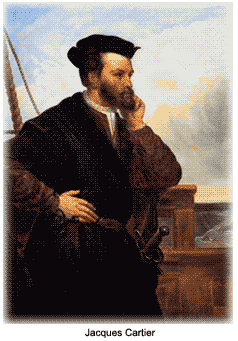Jacques Cartier, the French navigator, established his country’s claim to present-day Canada through his explorations of the Gulf of St. Lawrence and the St. Lawrence River.
 Jacques Cartier was born in 1491 in the French seaport town of Saint-Malo and later studied navigation in Dieppe. His early activities remain somewhat murky, but some historians have advanced the idea that he accompanied fishermen to Newfoundland in the 1520s. Other believe that Cartier sailed with Giovanni da Verrazzano on at least one of his voyages of discovery.
Jacques Cartier was born in 1491 in the French seaport town of Saint-Malo and later studied navigation in Dieppe. His early activities remain somewhat murky, but some historians have advanced the idea that he accompanied fishermen to Newfoundland in the 1520s. Other believe that Cartier sailed with Giovanni da Verrazzano on at least one of his voyages of discovery.
In any event, Cartier made his first documented voyage to the New World in 1534 under the auspices of Francis I. Enticed by the fabulous wealth being discovered by the Spanish, France hoped to do the same elsewhere in the Americas. Cartier’s ships sailed around the northern tip of Newfoundland and along its western coast into the Gulf of St. Lawrence. Cartier landed on the Gaspé Peninsula and formally claimed the area for France.
The explorers befriended native inhabitants and received reports from them about the existence of gold and jewels farther inland. On the return voyage to France, Cartier took two Indian boys and a supply of maize, probably the first of that crop to reach Europe.
Jacques Cartier’s first voyage helped to change the French conception of North America. It had been widely believed that the area’s only value lay in its fisheries. Cartier’s report, however, described fertile lands and the possibility of mineral wealth.
A second voyage began in 1535. After returning his young Indian guests to their homes, Jacques Cartier began to explore the St. Lawrence River. He pushed up river to a native village at the base of a large mountain, which he named Mont Real (later Montréal). With winter approaching, Cartier sailed down the river and established a camp at the eventual site of Québec. The party returned to France the following spring.
In 1541, a new venture was formed under the leadership of Jean-François de la Rocque, Sieur de Roberval. Cartier sailed in advance of the main party and returned to the St. Lawrence. After leaving a small contingent at Québec to establish a settlement, Jacques Cartier led a fruitless search for gold. An already uncomfortable winter at camp was further marred by Indian attacks.
In the spring, Jacques Cartier’s force began the return voyage to France. They encountered the long-delayed Roberval party near Newfoundland, but refused an order to return to the St. Lawrence.
Cartier, despite his contributions to a better understanding of North American geography, was regarded as a failure. No gold was discovered and no lasting settlements were created. The areas he explored would remain largely untouched by Europeans until the early years of the next century. Jacques Cartier died at his manor of Limoilou on the first of September, 1551.